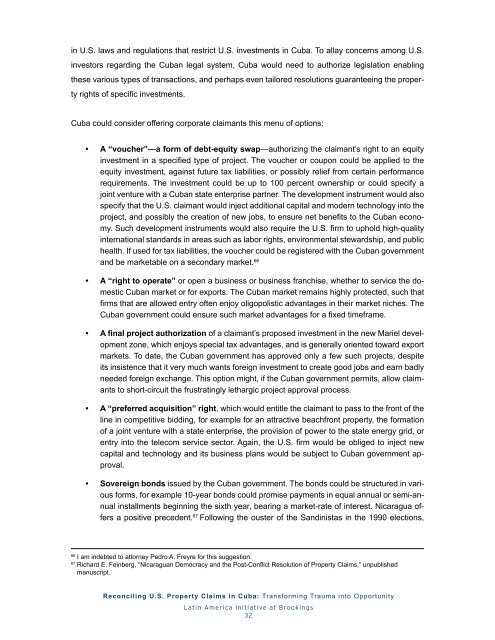Reconciling U.S Property Claims in Cuba
reconciling-us-property-claims-in-cuba-feinberg
reconciling-us-property-claims-in-cuba-feinberg
Create successful ePaper yourself
Turn your PDF publications into a flip-book with our unique Google optimized e-Paper software.
<strong>in</strong> U.S. laws and regulations that restrict U.S. <strong>in</strong>vestments <strong>in</strong> <strong>Cuba</strong>. To allay concerns among U.S.<br />
<strong>in</strong>vestors regard<strong>in</strong>g the <strong>Cuba</strong>n legal system, <strong>Cuba</strong> would need to authorize legislation enabl<strong>in</strong>g<br />
these various types of transactions, and perhaps even tailored resolutions guarantee<strong>in</strong>g the property<br />
rights of specific <strong>in</strong>vestments.<br />
<strong>Cuba</strong> could consider offer<strong>in</strong>g corporate claimants this menu of options:<br />
• A “voucher”—a form of debt-equity swap—authoriz<strong>in</strong>g the claimant’s right to an equity<br />
<strong>in</strong>vestment <strong>in</strong> a specified type of project. The voucher or coupon could be applied to the<br />
equity <strong>in</strong>vestment, aga<strong>in</strong>st future tax liabilities, or possibly relief from certa<strong>in</strong> performance<br />
requirements. The <strong>in</strong>vestment could be up to 100 percent ownership or could specify a<br />
jo<strong>in</strong>t venture with a <strong>Cuba</strong>n state enterprise partner. The development <strong>in</strong>strument would also<br />
specify that the U.S. claimant would <strong>in</strong>ject additional capital and modern technology <strong>in</strong>to the<br />
project, and possibly the creation of new jobs, to ensure net benefits to the <strong>Cuba</strong>n economy.<br />
Such development <strong>in</strong>struments would also require the U.S. firm to uphold high-quality<br />
<strong>in</strong>ternational standards <strong>in</strong> areas such as labor rights, environmental stewardship, and public<br />
health. If used for tax liabilities, the voucher could be registered with the <strong>Cuba</strong>n government<br />
and be marketable on a secondary market. 66<br />
• A “right to operate” or open a bus<strong>in</strong>ess or bus<strong>in</strong>ess franchise, whether to service the domestic<br />
<strong>Cuba</strong>n market or for exports. The <strong>Cuba</strong>n market rema<strong>in</strong>s highly protected, such that<br />
firms that are allowed entry often enjoy oligopolistic advantages <strong>in</strong> their market niches. The<br />
<strong>Cuba</strong>n government could ensure such market advantages for a fixed timeframe.<br />
• A f<strong>in</strong>al project authorization of a claimant’s proposed <strong>in</strong>vestment <strong>in</strong> the new Mariel development<br />
zone, which enjoys special tax advantages, and is generally oriented toward export<br />
markets. To date, the <strong>Cuba</strong>n government has approved only a few such projects, despite<br />
its <strong>in</strong>sistence that it very much wants foreign <strong>in</strong>vestment to create good jobs and earn badly<br />
needed foreign exchange. This option might, if the <strong>Cuba</strong>n government permits, allow claimants<br />
to short-circuit the frustrat<strong>in</strong>gly lethargic project approval process.<br />
• A “preferred acquisition” right, which would entitle the claimant to pass to the front of the<br />
l<strong>in</strong>e <strong>in</strong> competitive bidd<strong>in</strong>g, for example for an attractive beachfront property, the formation<br />
of a jo<strong>in</strong>t venture with a state enterprise, the provision of power to the state energy grid, or<br />
entry <strong>in</strong>to the telecom service sector. Aga<strong>in</strong>, the U.S. firm would be obliged to <strong>in</strong>ject new<br />
capital and technology and its bus<strong>in</strong>ess plans would be subject to <strong>Cuba</strong>n government approval.<br />
• Sovereign bonds issued by the <strong>Cuba</strong>n government. The bonds could be structured <strong>in</strong> various<br />
forms, for example 10-year bonds could promise payments <strong>in</strong> equal annual or semi-annual<br />
<strong>in</strong>stallments beg<strong>in</strong>n<strong>in</strong>g the sixth year, bear<strong>in</strong>g a market-rate of <strong>in</strong>terest. Nicaragua offers<br />
a positive precedent. 67 Follow<strong>in</strong>g the ouster of the Sand<strong>in</strong>istas <strong>in</strong> the 1990 elections,<br />
66<br />
I am <strong>in</strong>debted to attorney Pedro A. Freyre for this suggestion.<br />
67<br />
Richard E. Fe<strong>in</strong>berg, “Nicaraguan Democracy and the Post-Conflict Resolution of <strong>Property</strong> <strong>Claims</strong>,” unpublished<br />
manuscript.<br />
<strong>Reconcil<strong>in</strong>g</strong> U.S. <strong>Property</strong> <strong>Claims</strong> <strong>in</strong> <strong>Cuba</strong>: Transform<strong>in</strong>g Trauma <strong>in</strong>to Opportunity<br />
Lat<strong>in</strong> America Initiative at Brook<strong>in</strong>gs<br />
32


